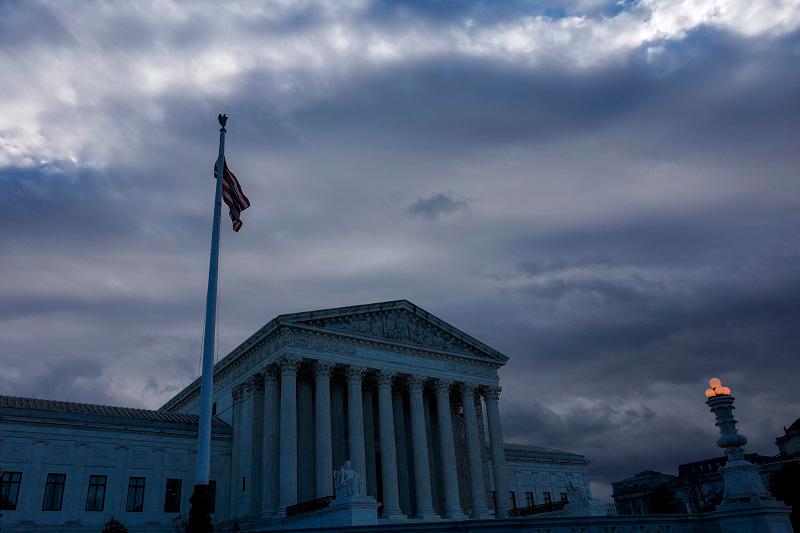WASHINGTON: The U.S. Supreme Court on Tuesday permitted President Donald Trump’s administration to implement his ban on transgender people in the military, allowing the armed forces to discharge the thousands of current transgender troops and reject new recruits while legal challenges play out.
The court granted the Justice Department’s request to lift a federal judge’s nationwide order blocking the military from carrying out Trump’s prohibition on transgender servicemembers. The Republican president’s directive was one of a series of steps he has taken to curb transgender rights.
The court’s brief order was unsigned, as is typical in emergency matters that come before it. The court has a 6-3 conservative majority. Its three liberal justices - Sonia Sotomayor, Elena Kagan and Ketanji Brown Jackson - publicly dissented from the decision.
Seattle-based U.S. District Judge Benjamin Settle earlier found that Trump’s order likely violates the U.S. Constitution’s Fifth Amendment right to equal protection under the law. Trump signed an executive order in January after returning to the presidency that reversed a policy implemented under his Democratic predecessor Joe Biden that had allowed transgender troops to serve openly in the American armed forces. Biden said at the time that “America is safer when everyone qualified to serve can do so openly and with pride.”
Trump’s directive cast the gender identity of transgender people as a lie and asserted that they are unable to satisfy the standards needed for military service.
“A man’s assertion that he is a woman, and his requirement that others honor this falsehood, is not consistent with the humility and selflessness required of a service member,“ Trump’s directive stated.
LGBT rights groups Lambda Legal and Human Rights Campaign Foundation, which are helping represent plaintiffs challenging the ban, called the Supreme Court’s decision a “devastating blow to transgender servicemembers who have demonstrated their capabilities and commitment to our nation’s defense.”
The court, they said, has “sanctioned a policy that has nothing to do with military readiness and everything to do with prejudice.”
The court’s decision on Tuesday did not resolve the legal merits of the case. The litigation will continue in lower courts and could return to the justices in the future.
‘READINESS AND LETHALITY’
White House Press Secretary Karoline Leavitt on social media called Tuesday’s decision a massive victory for Trump, adding that the president and Defense Secretary Pete Hegseth “are restoring a military that is focused on readiness and lethality - not DEI (diversity, equity and inclusion) or woke gender ideology.” The Pentagon issued guidance to implement Trump’s executive order, disqualifying from military service current troops and applicants with a history or diagnosis of gender dysphoria or who had undergone gender transition steps. The guidance allowed people to be considered for a waiver on a case-by-case basis if their service would directly support “warfighting capabilities.”
Gender dysphoria is the clinical diagnosis for significant distress that can result from an incongruence between a person’s gender identity and the sex they were assigned at birth.
A U.S. defense official has told Reuters that as of late last year there were 4,240 U.S. active-duty and National Guard transgender troops. Transgender rights advocates have given higher estimates. During his first term as president, Trump took aim at transgender military personnel with a more limited restriction. The Supreme Court in 2019 allowed the Pentagon to enforce Trump’s transgender prohibition that had let certain personnel diagnosed with gender dysphoria after entering the military to continue to serve.
The lawsuit in which Settle acted was filed by seven active-duty transgender troops, a transgender man seeking to enlist and a civil rights advocacy group. Settle, an appointee of Republican former President George W. Bush, found that Trump’s policy was “unsupported, dramatic and facially unfair,“ and said the administration provided no evidence of any harm resulting from transgender people serving the military.
U.S. CULTURE WARS Transgender rights are a flashpoint in the U.S. culture wars. Trump has targeted the rights of transgender people in a series of executive orders including one stating that the U.S. government will recognize only two sexes, male and female, and that they are not changeable. Trump also signed an order to end federal funding or support for healthcare that aids the transition of transgender youth and another one attempting to exclude transgender girls and women from female sports.
Hegseth has embraced conservative stances on culture war issues, including eliminating diversity initiatives at the Pentagon. Speaking earlier on Tuesday, Hegseth told a conference hosted by U.S. special operations forces: “No more pronouns, no more climate-change obsessions, no more emergency vaccine mandates, no more dudes in dresses.” The San Francisco-based 9th U.S. Circuit Court of Appeals had declined the administration’s request to put Settle’s order on hold.
In a separate case, Washington, D.C.-based U.S. District Judge Ana Reyes also had issued a nationwide injunction blocking Trump’s ban while that litigation proceeds. The U.S. Court of Appeals for the District of Columbia Circuit placed that injunction temporarily on hold. The Supreme Court is expected to rule in a major transgender rights case by the end of June. The justices heard arguments on December 4 over the legality of a Republican-backed ban in Tennessee on gender-affirming medical care for transgender minors.









